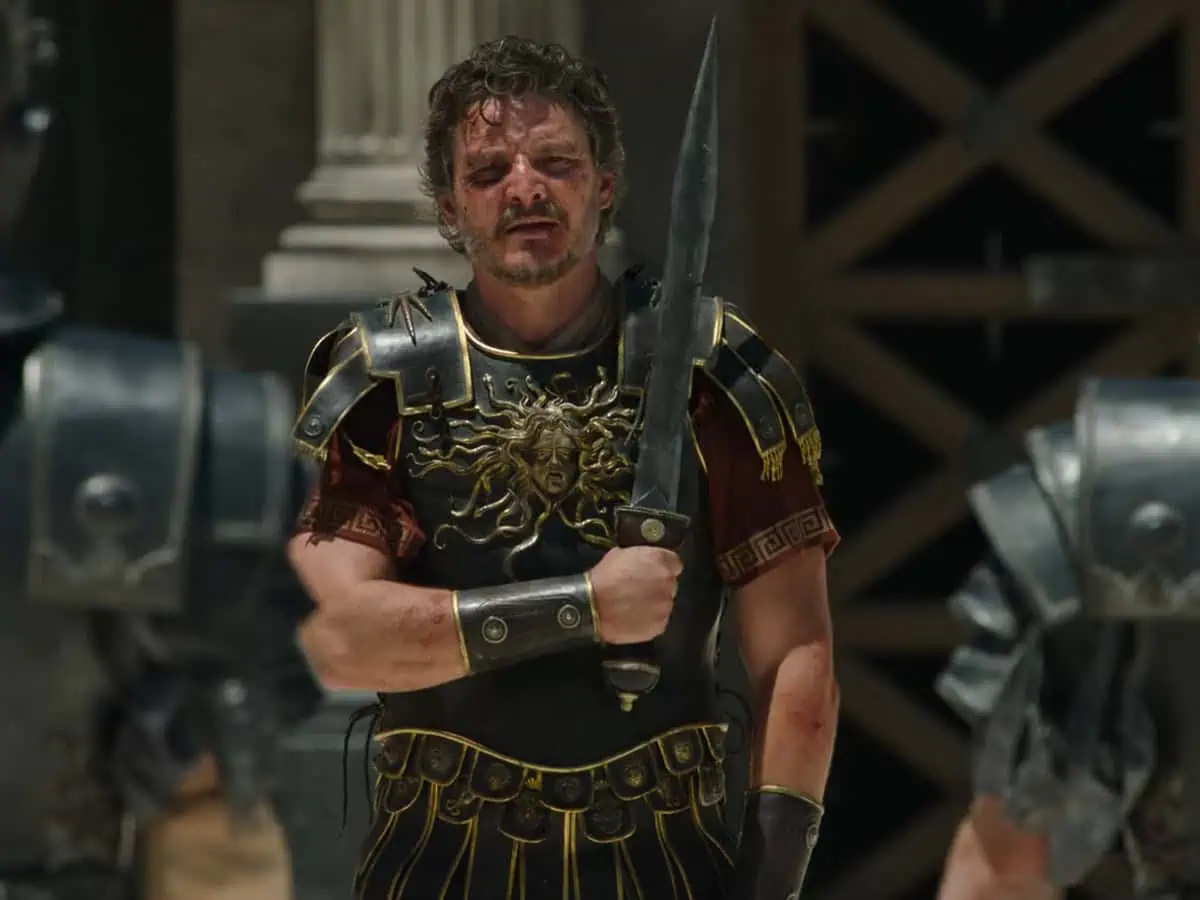Kelaru & Fulton rating: ★★★½
Runtime: 2 hrs 28 mins
You’d think having Ridley Scott back in the director’s chair would be a good thing, but somehow this sequel misses the mark. It’s a textbook example of sacrificing story for spectacle.
The film starts strong, following Lucius (Paul Mescal), a Numidian soldier captured during Rome’s conquest of his city, led by General Marcus Acacius (Pedro Pascal). In the aftermath of the battle—which leaves Lucius’ wife, Arishat (Yuval Gonen), among the casualties—Lucius is enslaved and sold as a gladiator to Macrinus (Denzel Washington), a wealthy slave trader with hidden motives.
So far, so good. This is a solid foundation, skilfully setting up the character arcs to foreshadow future conflict - a technique successfully done in another Ridley Scott war film, The Duel. But as soon as the story moves to Rome, it pivots sharply. Character development gives way to over-the-top arena battles delivered via CGI—and a hefty $210 million budget.
The film feels like it’s rushing to get to the arena, throwing everything at the characters: monkeys, sharks, and, of course, the usual arrows and swords. Yet it never takes the time to let us truly connect with them. Lucius’ relationship with his wife gets about five minutes of screen time before she’s killed, and her death is supposed to drive his entire revenge arc. But because we’ve barely seen their bond, her loss doesn’t land with the emotional weight it needs to justify Lucius’ actions.
Similarly, General Acacius starts with potential as a disillusioned Roman hero who wants to 'restore' the glory of Rome. Together with Lucilla (Connie Nielsen), Lucius’ mother and his own wife, Acacius plans to overthrow the twin emperors Geta and Caracalla. But this promising arc is abandoned midway through the film. The confrontation between Acacius and Lucius, which should be a climactic moment, feels underwhelming and out of place because neither character has been developed enough.
Acacius remains a flat character—a generic hero whose motivations and conflicts are never explored. Missed opportunities abound. He could have been a failed father figure to Lucius, unable to earn his respect. Or jealousy could have driven his actions, seeing Lucilla care more for her son than for Rome or Acacius himself. None of this is explored.
On the other hand, Lucius also feels underwritten. He’s sometimes surprisingly unaffected by his wife’s death, cracking jokes with his fellow gladiators and his doctor, only becoming serious when the plot demands it. Paul Mescal does his best, and his moments of intensity—marked by a glint of madness in his eyes—show flashes of brilliance. But his arc stalls after his confrontation with Acacius, and his sudden shift to wanting to 'save Rome' feels unearned and rushed.
Thankfully, two elements redeem parts of the film: Denzel Washington and the CGI.
Denzel Washington is magnetic, stealing every scene he’s in despite the flimsy dialogue. He brings gravitas and charisma to Macrinus, fully embodying the role of a cunning slave trader. It’s a joy to watch him work, even if his character’s arc is used more as a plot device than as a fully realised narrative. An Oscar nomination for Supporting Actor wouldn’t be surprising, though he might not win due to his limited screen time.
The CGI is equally impressive, extending beyond the Colosseum to the stunningly realised Rome skyline, ornate sets, and immersive battle sequences. But while the technical aspects shine, they can’t compensate for what’s missing: emotional investment in the characters.
It’s easy to be overwhelmed by modern technology in filmmaking, but what made the original Gladiator so memorable wasn’t just the impressive CGI. I still vividly recall the first reveal of the Colosseum—a genuine 'wow' moment. Its impact came not only from the visuals but from the timing. The film had already made us care deeply about the characters, so the reveal carried emotional weight; it wasn’t just spectacle for spectacle’s sake. Twenty-four years ago, Gladiator broke the mould, delivering an expensive historical epic with heart and soul. It was focused, brimming with energy, and left a cultural imprint that still resonates today.
In Gladiator 2, the spectacle overshadows the story. The pacing feels off, and character development is sacrificed for increasingly elaborate arena scenes. It’s a shame because the foundations for a great film were there. But like Rome itself, a film can’t stand on spectacle alone—it needs a solid structure of story and character to hold it up.
Gladiator 2 had the potential to be a worthy successor but instead collapses under the weight of its own ambition.
%20Logo%20Black%20over%20White.png)
















